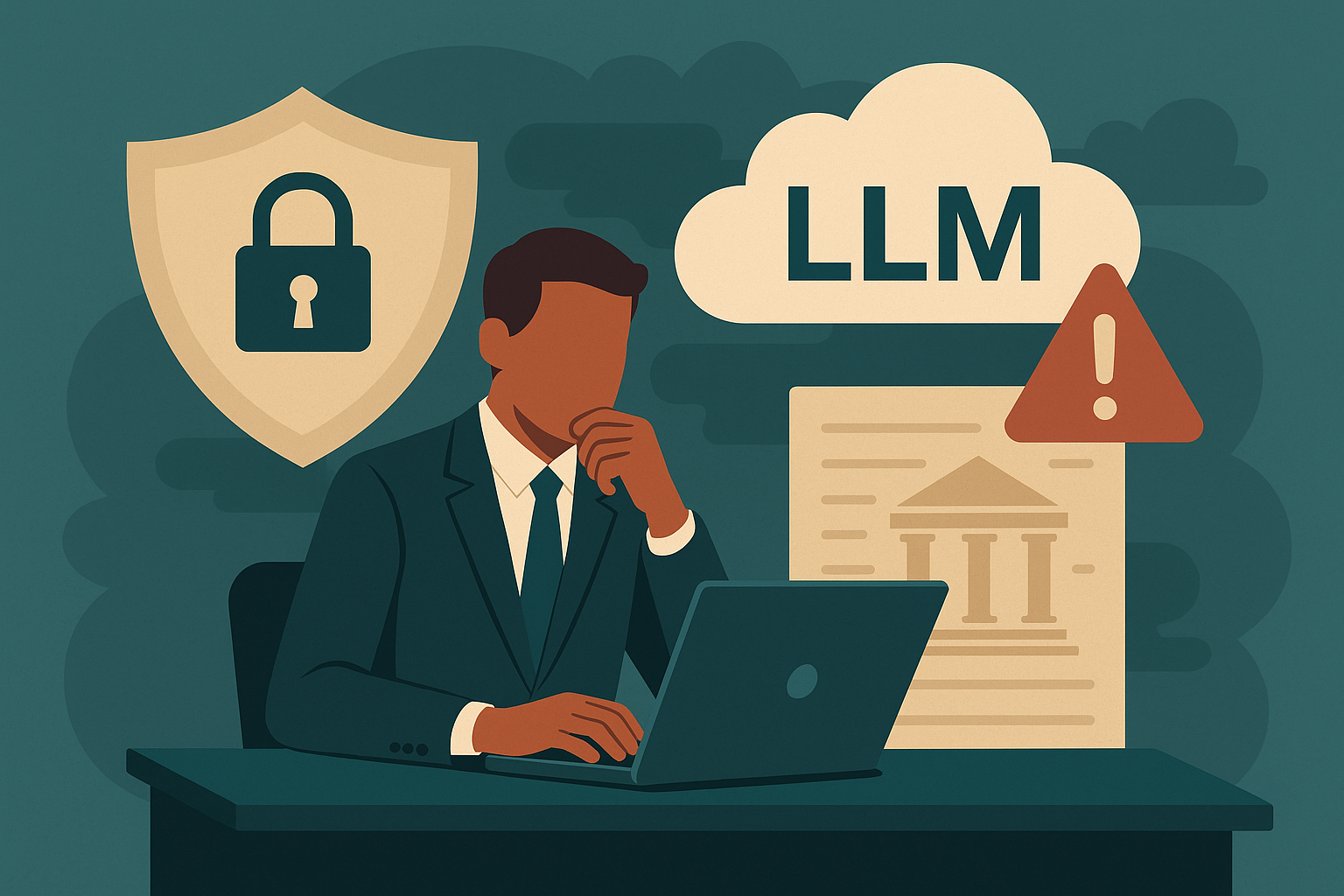In the legal profession, confidentiality is not a preference – it’s a core obligation. From client intake to final judgment, lawyers are ethically and legally bound to protect privileged information. But as artificial intelligence reshapes the legal landscape, many firms are considering the use of cloud-based Large Language Models (LLMs), such as ChatGPT, Copilot, or Bard, to enhance productivity. While the temptation to adopt these powerful tools is understandable, the risks associated with using cloud-based AI platforms are simply too great. No matter what providers claim about data protection, lawyers cannot afford to outsource trust.
Promises vs. Accountability
Cloud-based LLM providers often make sweeping statements about security, privacy, and encryption. They may offer enterprise contracts and marketing assurances that client data will not be used for training or will be stored securely. But here’s the legal reality: they are not accountable for your professional obligations. If a breach occurs or if client information is exposed, you – not the provider – are responsible. Promises do not equal enforceable confidentiality. No cloud vendor can offer the kind of airtight professional secrecy required under legal ethics rules.
The moment a lawyer uploads confidential information to a third-party LLM hosted in the cloud, they may be violating their duty of care and breaching client privilege – regardless of the tool’s convenience or functionality.
The Illusion of Control
Many legal professionals assume that anonymizing prompts or relying on vendor disclaimers is enough to protect them. But this is a dangerous illusion. Most LLMs store inputs and outputs. Some use this data for model improvement. Others grant vague exceptions in their terms of use. The fine print is rarely reassuring. And even if a provider has good intentions, bugs, misconfigurations, or malicious actors can still expose sensitive data. We’ve already seen real-world examples of LLM leaks, including the ChatGPT data breach in March 2023 and Samsung’s internal leak via ChatGPT.
Using a cloud-based LLM is equivalent to discussing a client’s case on a public line with no guarantees who’s listening in. That’s not compliance – that’s risk mismanagement.
Regulatory and Ethical Red Flags in the EU
Lawyers in the EU are bound by strict data protection and confidentiality laws, including the General Data Protection Regulation (GDPR) and national bar rules such as Germany’s §43a BRAO. The German Federal Bar (BRAK) has explicitly warned lawyers that using cloud-based LLMs to process client data may constitute a breach of confidentiality unless the provider is contractually bound and fully compliant with professional secrecy laws (source).
Additionally, the Italian Data Protection Authority (Garante) has fined OpenAI €15 million for GDPR violations, citing lack of transparency and lawful basis for processing personal data in ChatGPT. This enforcement underscores that cloud LLMs are subject to real regulatory scrutiny.
The European Data Protection Board (EDPB) has confirmed that AI platforms using or generating personal data must comply with GDPR and that anonymization claims from providers must be independently verified—not just assumed (EDPB ChatGPT Task Force report).
The Council of Bars and Law Societies of Europe (CCBE) and national bars continue to emphasize that professional secrecy obligations cannot be overridden by technology convenience. If client data is handed to a provider who is not under direct control or equivalent legal duty, this could result in an ethical violation or breach of professional conduct rules.
Professional Ethics Demand Better
Bar associations and legal regulators are clear: confidentiality is sacrosanct. That’s why many firms are now issuing internal policies banning the use of cloud-based generative AI tools for any client-related work. No matter how helpful or efficient an AI assistant seems, it cannot compromise the duties that define the legal profession.
Responsible innovation means applying legal technology in ways that enhance client service without jeopardizing trust. The right AI solution must be purpose-built for legal professionals, with confidentiality and control as foundational principles – not optional extras.
Our Approach: Control, Not Promises
At ALPHALECT.ai, we believe AI should empower legal professionals – not endanger them. That’s why we’ve built a Legal AI platform designed from the ground up to support absolute confidentiality, enforceable data boundaries, and complete transparency. Your data stays where it belongs: under your control.
No external training, no data harvesting, no guesswork.
We provide lawyers, patent professionals, and in-house counsel with the tools to work smarter without compromising compliance. Because your career – and your client’s future – deserve more than promises.
Conclusion: Choose Integrity Over Hype
The future of law will include AI. But the future of ethical, compliant legal practice will not include risky dependencies on cloud-based LLMs. No matter what they promise, if they are not under your control, they are not safe.
Choose legal AI built for legal standards. Choose confidentiality. Choose control.
Don’t wait for regulatory investigations, client mistrust, or a preventable data breach to highlight the vulnerabilities of your current tech stack. Now is the time to evaluate how your firm manages AI use. If you’re relying on cloud-based LLMs that operate outside your direct control, you’re assuming risks that could jeopardize your ethical duties, your license, and your clients’ trust.
At ALPHALECT.ai, we explore the power of AI to revolutionize the European IP industry, building on decades of collective experience in the industry and following a clear vision for its future. For answers to common questions, explore our detailed FAQ. If you require personalized assistance or wish to learn more about how legal AI can benefit innovators, SMEs, legal practitioners, and innovation and the society as a whole, don’t hesitate to contact us at your convenience.


Pingback:How AI is Transforming the European IP Landscape: Insights for Patent Attorneys and IP Professionals – ALPHALECT.ai
Pingback:The Confidentiality Imperative of the Institute of European Patent Attorneys (epi) – ALPHALECT.ai
Pingback:Open Source vs Proprietary LLMs for Legal Applications: Pros & Cons, Insights, Selection Criteria – ALPHALECT.ai